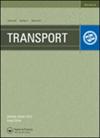车位可用性预测
IF 1.3
4区 工程技术
Q3 TRANSPORTATION SCIENCE & TECHNOLOGY
引用次数: 0
摘要
智能泊车系统(IPS)可以让客户根据自己的喜好选择停车场,无需搜索可用停车位(位置)即可快速停车,甚至可以提前预订位置,避免排队。IPS提供了在寻找停车位的同时减少燃料(能源)浪费的可能性,从而减少有害排放。有些系统与车载导航系统相互作用,为用户提供实时信息,例如给定停车场(停车场)的免费停车位、位置和停车费。然而,这些系统中很少提供在特定时间预测利用情况的信息。本文描述了在超市停车场进行的交通调查结果,并提出了基于这些调查数据的实时停车位可用性预测模型。该模型被表述为非齐次马尔可夫链,作为预测停车位可用性的工具。转换矩阵是为不同的时间段计算的,它允许并包括不同的驾驶员的行为和期望。所提出的预测模型足以供IPS在不同通信手段的支持下使用,如互联网、导航系统(GPS、伽利略等)和个人通信服务(移动电话)。本文章由计算机程序翻译,如有差异,请以英文原文为准。
THE PREDICTION OF PARKING SPACE AVAILABILITY
Intelligent Parking Systems (IPS) allow customers to select a car park according to their preferences, rapidly park their vehicle without searching for the available parking space (place) or even book their place in advance avoiding queues. IPS provides the possibility to reduce the wastage of fuel (energy) while finding a parking place and consequently reduce harmful emissions. Some systems interact with in-vehicle navigation systems and provide users with information in real-time such as free places available at a given parking lot (car park), the location and parking fees. Few of these systems, however, provide information on the forecasted utilisation at specific time. This paper describes results of a traffic survey carried out at the parking lot of supermarket and the proposal of the model predicting real-time parking space availability based on these surveyed data. The proposed model is formulated as the non-homogenous Markov chains that are used as a tool for the forecasting of parking space availability. The transition matrices are calculated for different time periods, which allow for and include different drivers’ behaviour and expectations. The proposed forecasting model is adequate for potential use by IPS with the support of different communication means such as the internet, navigation systems (GPS, Galileo etc.) and personal communication services (mobile-phones).
求助全文
通过发布文献求助,成功后即可免费获取论文全文。
去求助
来源期刊

Transport
Engineering-Mechanical Engineering
CiteScore
3.40
自引率
5.90%
发文量
19
审稿时长
4 months
期刊介绍:
At present, transport is one of the key branches playing a crucial role in the development of economy. Reliable and properly organized transport services are required for a professional performance of industry, construction and agriculture. The public mood and efficiency of work also largely depend on the valuable functions of a carefully chosen transport system. A steady increase in transportation is accompanied by growing demands for a higher quality of transport services and optimum efficiency of transport performance. Currently, joint efforts taken by the transport experts and governing institutions of the country are required to develop and enhance the performance of the national transport system conducting theoretical and empirical research.
TRANSPORT is an international peer-reviewed journal covering main aspects of transport and providing a source of information for the engineer and the applied scientist.
The journal TRANSPORT publishes articles in the fields of:
transport policy;
fundamentals of the transport system;
technology for carrying passengers and freight using road, railway, inland waterways, sea and air transport;
technology for multimodal transportation and logistics;
loading technology;
roads, railways;
airports, ports, transport terminals;
traffic safety and environment protection;
design, manufacture and exploitation of motor vehicles;
pipeline transport;
transport energetics;
fuels, lubricants and maintenance materials;
teamwork of customs and transport;
transport information technologies;
transport economics and management;
transport standards;
transport educology and history, etc.
 求助内容:
求助内容: 应助结果提醒方式:
应助结果提醒方式:


